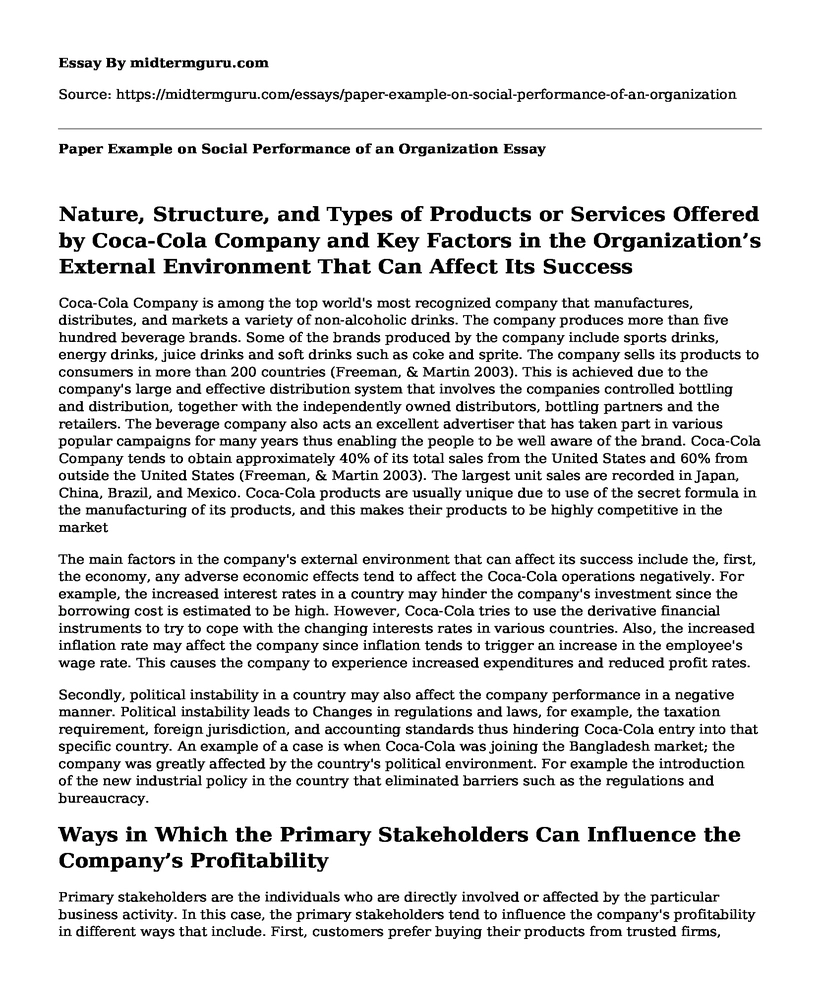Nature, Structure, and Types of Products or Services Offered by Coca-Cola Company and Key Factors in the Organization’s External Environment That Can Affect Its Success
Coca-Cola Company is among the top world's most recognized company that manufactures, distributes, and markets a variety of non-alcoholic drinks. The company produces more than five hundred beverage brands. Some of the brands produced by the company include sports drinks, energy drinks, juice drinks and soft drinks such as coke and sprite. The company sells its products to consumers in more than 200 countries (Freeman, & Martin 2003). This is achieved due to the company's large and effective distribution system that involves the companies controlled bottling and distribution, together with the independently owned distributors, bottling partners and the retailers. The beverage company also acts an excellent advertiser that has taken part in various popular campaigns for many years thus enabling the people to be well aware of the brand. Coca-Cola Company tends to obtain approximately 40% of its total sales from the United States and 60% from outside the United States (Freeman, & Martin 2003). The largest unit sales are recorded in Japan, China, Brazil, and Mexico. Coca-Cola products are usually unique due to use of the secret formula in the manufacturing of its products, and this makes their products to be highly competitive in the market
The main factors in the company's external environment that can affect its success include the, first, the economy, any adverse economic effects tend to affect the Coca-Cola operations negatively. For example, the increased interest rates in a country may hinder the company's investment since the borrowing cost is estimated to be high. However, Coca-Cola tries to use the derivative financial instruments to try to cope with the changing interests rates in various countries. Also, the increased inflation rate may affect the company since inflation tends to trigger an increase in the employee's wage rate. This causes the company to experience increased expenditures and reduced profit rates.
Secondly, political instability in a country may also affect the company performance in a negative manner. Political instability leads to Changes in regulations and laws, for example, the taxation requirement, foreign jurisdiction, and accounting standards thus hindering Coca-Cola entry into that specific country. An example of a case is when Coca-Cola was joining the Bangladesh market; the company was greatly affected by the country's political environment. For example the introduction of the new industrial policy in the country that eliminated barriers such as the regulations and bureaucracy.
Ways in Which the Primary Stakeholders Can Influence the Company’s Profitability
Primary stakeholders are the individuals who are directly involved or affected by the particular business activity. In this case, the primary stakeholders tend to influence the company's profitability in different ways that include. First, customers prefer buying their products from trusted firms, therefore since Coca-Cola is a trusted firm it has been able to gain a lot of customers thus making it very competitive. The huge number of customers enables the company to achieve more the profitability and market dominance. Secondly, having an ethical and stable supply is important for the creation of Coca-Cola firms in the local communities. Therefore having a good supplier who delivers good products and services helps, the company to attract and maintain its customers globally thus enhancing the company's profitability. Thirdly, the stakeholders tend to provide a direct stake or capital to the company to facilitate in its development (Dul & Neumann 2009). The stakeholder's help to raise the needed capital for the company to improve and increase its products to attract more buyers.
Controversial Corporate Social Responsibility Concern Associated With Coca-Cola Company
One of the corporate social responsibility concern associated with the Coca-Cola Company is the allegation of the presence of pesticides in the beverage drinks by the Indian government. However, after conducting investigations through testing the beverages, it was found that the pesticides did not meet the European standards but were however considered to be safe as per the local standards (Carroll, 2008). It was therefore concluded that the company did not violate the countries laws. The Indian government also found the need to implement appropriate measures for the carbonated drinks.
References
Carroll, A. B. (2008). History of corporate social responsibility: Concepts and practices. The Oxford handbook of corporate social responsibility, 19-46.
Dul, J., & Neumann, W. P. (2009). Ergonomics contributions to company strategies. Applied Ergonomics, 40(4), 745-752.
Freeman, B., & Martin, C. (2003). Coca-Cola Company.
Cite this page
Paper Example on Social Performance of an Organization. (2022, Sep 21). Retrieved from https://midtermguru.com/essays/paper-example-on-social-performance-of-an-organization
If you are the original author of this essay and no longer wish to have it published on the midtermguru.com website, please click below to request its removal:
- Global Business Expansion Paper Example
- Essay on Reinstating the Position of the Company in the Market: New Balance Company
- Analysis Paper Example on Qantas Company
- Essay on International Law and Business: Dodd-Frank Act
- Swiss: 30 Years of Growth & Expansion Through Acquisitions - Essay Sample
- Demarco: Balancing Care for Environment, Country & Employer - Essay Sample
- Dell - US Multinational Company Providing PC and Technology Services - Essay Sample







